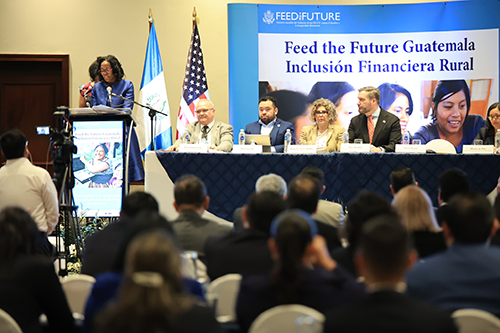
By enhancing financial literacy, establishing partnerships with financial institutions, and helping financial service providers reach underserved rural markets with better, tailored products, the project aims to help rural Guatemalans overcome barriers to financial access and encourage investment in the agriculture sector to improve food security and resilience. RFIG aligns with the broader goals of the U.S. Strategy to Address the Root Causes of Migration in Central America.
The Rural Financial Inclusion in Guatemala project was announced on January 15 when USAID Administrator Samantha Power was in Guatemala for the inauguration of President Bernardo Arévalo.
Last week’s launch event was attended by Gabriela García-Quinn, Guatemala’s Minister of Economy; Nick Estrada, Guatemala’s Vice Minister of Rural Development; Tobin Bradley, U.S. Ambassador to Guatemala; USAID Guatemala officials; and representatives from NCBA CLUSA including Executive Vice President and CFO Valeria R. Roach, and Vice President of Business Development Jacqueline Bass.
“Financial inclusion is fundamental for economic development and prosperity for all,” Ambassador Bradley said in a press release about the launch from the Ministry of Economy. Rural Guatemalans, he added, need access to financial services to save, invest in or grow their businesses, and contribute to the productivity of Guatemala, the Guatemalan New Agency reported. By encouraging entrepreneurship and increasing economic prosperity, RFIG is poised to “turn Guatemala into a regional economic engine,” the U.S. Embassy in Guatemala said in a post on X.

Building a rural financial ecosystem
Financial inclusion in Guatemala has long been a challenge to the growth and economic development of the country’s Western Highlands, a region that experiences the country’s highest levels of irregular migration. Smallholder farmers in the region are especially vulnerable to economic shocks and the impacts of natural disasters, deepening financial inequality. By expanding access to financial services, the Rural Financial Inclusion in Guatemala project will allow farmers and agribusinesses to grow their incomes and food production, and adopt climate-smart agricultural practices that will help them become more resilient to shocks. Ultimately, the project seeks to promote sustainable economic development, reduce migration and increase food security.
“The Feed the Future Rural Financial Inclusion in Guatemala project embodies the principles necessary to build a better future for rural populations—especially for small farmers, micro and small enterprises, entrepreneurs, women and indigenous youth by supporting better access to and use of financial services in rural areas,” Roach said.

- Increase the capacity of cooperatives, credit unions and other financial institutions to deliver financial services as a path to financial inclusion and the creation of economic opportunities for rural people.
- Address the unique needs of underserved rural consumers and market segments (including youth, women, indigenous and diaspora populations) in a way that builds trust in formal financial services and promotes financial literacy.
- Reduce barriers for remittance senders and receivers to access and use financial services to create economic opportunities for themselves and their families.
For 70 years, NCBA CLUSA has worked in 100+ countries in Africa, Latin America and Southeast Asia, building resilient communities, creating economic opportunities and strengthening cooperatives. Our work empowers smallholder farmers, women and youth in the areas of food security and nutrition-led agriculture, climate-smart agriculture, market development, natural resources management, positive youth development, gender equality and enabling regulatory environments. We envision a world where people have the knowledge, resources and authority to build prosperity for themselves and future generations.


